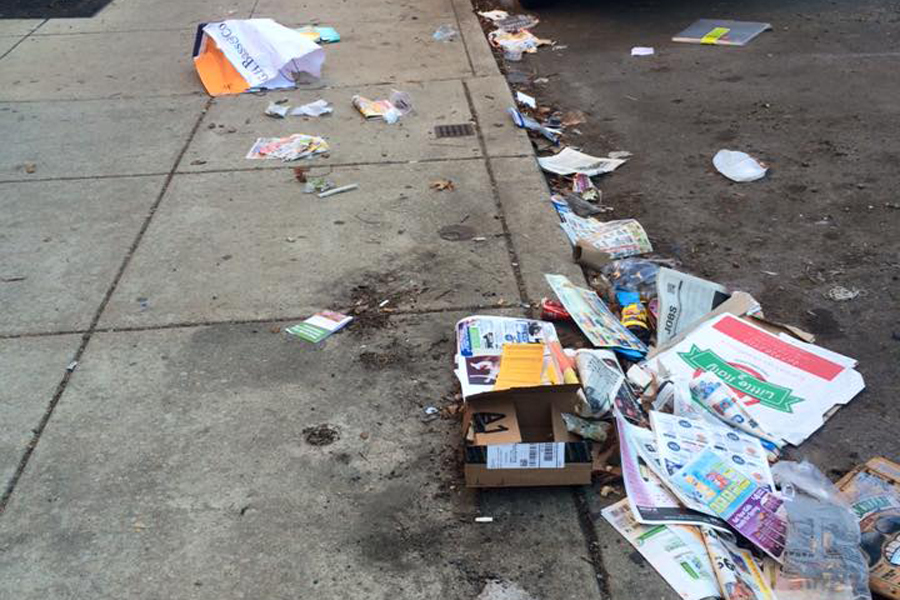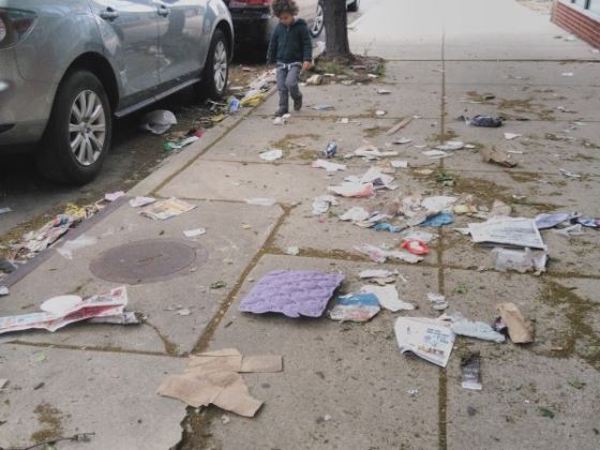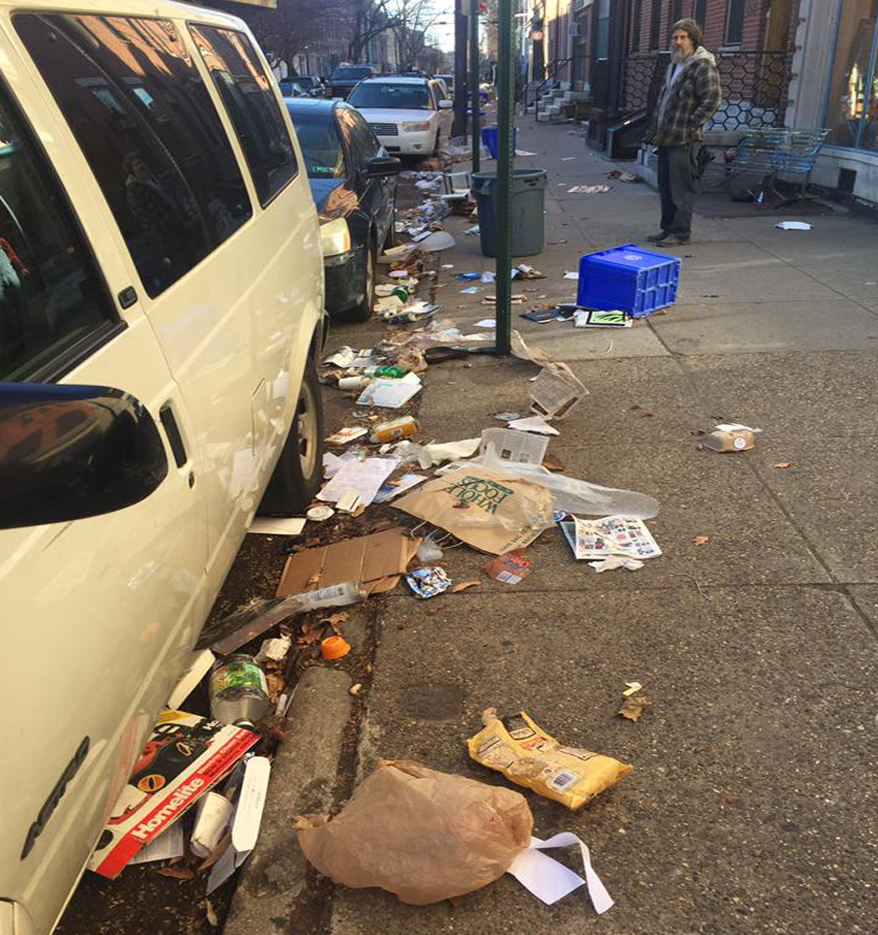Why Is Crowdfunding the Only Way to Get Your Street Cleaned in Philly?
It’s been nearly a decade since Philadelphia provided this basic municipal service citywide, so residents in Bella Vista decided to do it on their own dime. What about the rest of us?
In Italian, Bella Vista means “beautiful sight.” It’s the name city planners chose to rechristen the neighborhood bounded by 6th Street, 11th Street, South Street, and Washington Avenue after it was scrubbed clean and gentrified in the early 1970s, and despite being a bit contrived, the moniker stuck as the area became one of Philly’s go-to neighborhoods.
Take a stroll through Bella Vista lately on the day after trash pickup (if you’re lucky), however, and you’ll find yourself questioning how the name squares with the sight of old pizza boxes, Tastykake wrappers, and shredded Amazon envelopes blowing all over the place.
Before the Great Recession, regular street cleanings were a basic right afforded to citizens in all of Philly’s neighborhoods. But the program was completely dismantled in 2009 when the funds were diverted to other uses, and today a sidewalk needs to fall within the boundaries of special business improvement district like South Street (or anywhere in Center City, for that matter) for a city employee to come sweep it clean of debris.
So what’s a neighborhood like Bella Vista to do? Residents fed up with the state of the streets have turned to a crowdfunding campaign. And with as many supporters as the Bella Vista Neighbors Association counts among its ranks, the registered community organization has raised more than $15,000 in private funds (including $500 from Councilman Mark Squilla) of the projected $25,000 annual cost for twice-monthly street sweeps. But not all neighborhoods are created equal, which poses a huge problem in pay-your-own-way politics.
Broken Promises
Back in 2015, when he was but a lowly councilman stumping for votes, Jim Kenney ran on a campaign platform that included one huge promise: the return of neighborhood street cleanings. “I’m not going to have people screaming and yelling that they don’t want to move their car from one side of the street to the other because it’s such an inconvenience, when they do it in Manhattan twice a week,” he told NBC at the time.
Being from South Philly and understanding that there are neighborhoods in which this inconvenience is very much a deal-breaker (think about all those old ladies who use their Caddies once a week to drive to church), Kenney offered the compromise of sponsoring street cleaning service for individual areas that wanted it.
“[Kenney] believes that communities who want street sweeping and who are willing to move their cars should be able to access that resource,” campaign spokesperson Lauren Hitt told the Inquirer in June 2015. “Those neighborhoods should not lose out entirely because some communities value street parking over street sweeping. Every community’s needs and priorities are different, and Jim wants to respect that when it comes to littering and other everyday violations.”
Yet here we stand less than five years later with Bella Vista and other neighborhoods begging for any civic dollar they can muster to bolster their grassroots projects. Think Kenney and City Hall have changed their tune on selective street cleaning in the years since that promise was first made? You betcha.
“We don’t deny that there are certain neighborhoods that do want street sweeping,” Nic Esposito, director of the Philadelphia Streets Department’s Zero Waste and Litter initiative, tells Philly Mag. “However, when we create public amenities, we ultimately have to make them available for all neighborhoods. We’re very excited that Bella Vista is taking the initiative and as we study this system more through the Zero Waste and Litter Cabinet, which was one of our recommendations in our Action Plan, we hope to use their data and experience to guide ours.”
A pilot program paid for entirely by the test subjects themselves? How can our cash-strapped city say no?
Litteradelphia
“We are the only major city in the United States that doesn’t fund street cleaning services,” Brandy Bones, vice president of the BVNA, tells Philly Mag. “If you read the city’s Zero Waste plan, what they put in there basically argues that there’s a social contract between a Philadelphia citizen and the government where the citizen needs to do their part to clean up. And while yes, that is a part of it, no other city makes that argument. There is only so much that good citizens can do, as you can see with all of these grassroots movements like ours. But ultimately that falls short and that’s the problem we’re trying to address here.”
Comparatively, Bella Vista’s litter woes rank on the low end of the spectrum. The affluent neighborhood scored a 1.4 out of 5 on Philadelphia’s revamped Litter Index, which is used to measure the amount of garbage piling up on our streets. North Philly is where the majority of the city’s litter has accumulated, although there are blocks in South Philly’s Point Breeze neighborhood that likewise score within the index’s “extremely littered” designation.
According to Bones, the idea of grassroots-funded street cleaning in Philly began with the Clean Point Breeze Streets initiative, led by Angela Val, chief administration officer for Philly’s Convention and Visitors Bureau. Due to the lack of an organized RCO in Point Breeze, Val had to appeal directly to fellow residents for her crowdfunding campaign. In 2016, she was able to contract with a third-party organization for street cleanings that were ultimately deemed successful, although limited in coverage area. Last year, Clean Point Breeze Street set up a GoFundMe with a goal of raising $22,000 for expanded services. Over the course of 11 months, only $6,000 was donated.
“Look at the median income in Bella Vista,” Bones urges. “I’m not as much concerned about a divestment in Bella Vista as I am in other neighborhoods that are much poorer. What we need is a lot of time, a lot of resources, and the people who are willing to give 50 bucks to donate to this cause. That’s not an option in every neighborhood. I can effectively organize in my neighborhood to fundraise for street and sidewalk cleaning. That is just not a possibility everywhere.”
Others are trying to tackle that kind of disparity by putting street cleaning in the hands of volunteers. Not In Philly, the brainchild of Dave Brindley, designed an online platform in which willing individuals can sign up to adopt a block and become a point person for cleanup efforts. As more residents take on the responsibility themselves, asks Philly Mag’s own Fabiola Cineas, how long will it take Brindley’s model to render the Zero Waste Initiative completely useless?
In other comparable U.S. cities, municipal-funded street cleanings have never gone by the wayside. It’s been nearly a decade and Philly has bounced back admirably since the economic collapse, yet we still haven’t revived our street cleaning program. So what gives?
Stuck in Our Ways?
“Everything comes down to parking around here,” says Eugene Desyatnik, director of the BVNA. While the leader of this particular RCO is speaking directly to his neighborhood’s issue with litter on its blocks, he may have just coined the ultimate phrase to describe our incredibly stubborn city government, which has chosen to spend its resources on cleaning large dump sites over common street litter.
“This issue is not just about moving cars,” the Streets Department’s Esposito says. “That’s an unfair reduction and simplification of the issue. We only have so much money and resources to spend right now and a major priority is the fight against illegal dumping in predominantly lower-income neighborhoods, but also higher income neighborhoods as well. We can’t tell people who are getting dumped on in an egregious way that we can’t fully attack the problem because we are spending money on street sweeping in areas that are moderately littered.”
According to the Bella Vista neighbors and Councilman Squilla, this idea of moving cars to the other side of the street is exactly the root of the problem and serves as the underlying reason this impasse still exists to this day.
“City Council ultimately has to pass a new law to bring back street cleaning services,” Bones explains. “And the amount of complaints that they get from constituents about having to move their cars is the number-one issue that prevents us from bringing it back. But again, I think that’s a commonality across a lot of basic things that are needed.”
“Because the city doesn’t provide this basic service, it creates more inequity across the board where we already have so much,” she says. “We are at an advantage. Not every neighborhood has the same situation. That’s what pisses me off the most.”





